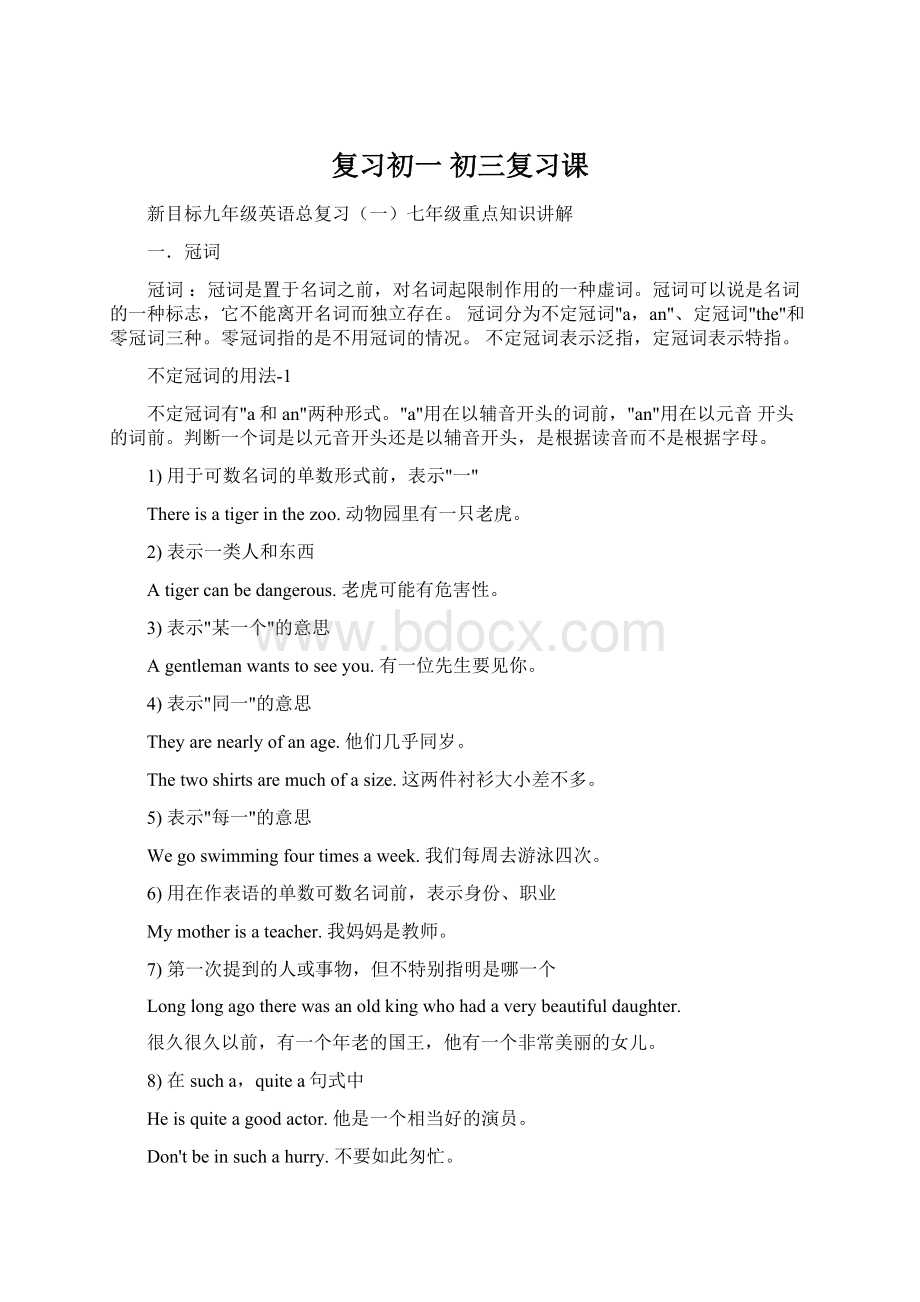复习初一 初三复习课.docx
《复习初一 初三复习课.docx》由会员分享,可在线阅读,更多相关《复习初一 初三复习课.docx(15页珍藏版)》请在冰豆网上搜索。

复习初一初三复习课
新目标九年级英语总复习
(一)七年级重点知识讲解
一.冠词
冠词:
冠词是置于名词之前,对名词起限制作用的一种虚词。
冠词可以说是名词的一种标志,它不能离开名词而独立存在。
冠词分为不定冠词"a,an"、定冠词"the"和零冠词三种。
零冠词指的是不用冠词的情况。
不定冠词表示泛指,定冠词表示特指。
不定冠词的用法-1
不定冠词有"a和an"两种形式。
"a"用在以辅音开头的词前,"an"用在以元音开头的词前。
判断一个词是以元音开头还是以辅音开头,是根据读音而不是根据字母。
1)用于可数名词的单数形式前,表示"一"
Thereisatigerinthezoo.动物园里有一只老虎。
2)表示一类人和东西
Atigercanbedangerous.老虎可能有危害性。
3)表示"某一个"的意思
Agentlemanwantstoseeyou.有一位先生要见你。
4)表示"同一"的意思
Theyarenearlyofanage.他们几乎同岁。
Thetwoshirtsaremuchofasize.这两件衬衫大小差不多。
5)表示"每一"的意思
Wegoswimmingfourtimesaweek.我们每周去游泳四次。
6)用在作表语的单数可数名词前,表示身份、职业
Mymotherisateacher.我妈妈是教师。
7)第一次提到的人或事物,但不特别指明是哪一个
Longlongagotherewasanoldkingwhohadaverybeautifuldaughter.
很久很久以前,有一个年老的国王,他有一个非常美丽的女儿。
8)在sucha,quitea句式中
Heisquiteagoodactor.他是一个相当好的演员。
Don'tbeinsuchahurry.不要如此匆忙。
9)在感叹句what...的句式中
Whataprettygirlsheis!
她是一个多么漂亮的女孩呀!
不定冠词的用法-2
用在某些表示数量的词组中:
alotof许多acoupleof一对agreatmany很多adozen一打(但也可以用onedozen)agreatdealof大量
定冠词的用法
1)用以特指某(些)人或某(些)事物
ThisisthehousewhereLuxunoncelived.这是鲁迅曾经住过的房子。
2)用于指谈话双方都明确所指的人或事物
Openthedoor,please.请把门打开。
3)用以复述上文提过的人或事物(第一次提到用“a或an”,以后再次提到用“the”)
Oncetherelivedalionintheforest.Everydaythelionaskedsmallanimalstolookforfoodforhim.从前森林里住着一只狮子。
每天这只狮子要小动物们为他寻找食物。
4)用在序数词和形容词最高级前
Januaryisthefirstmonthoftheyear.一月份是一年当中的第一个月。
ShanghaiisthebiggestcityinChina.上海是中国最大的城市。
5)表示世界上宇宙中独一无二的事物
thesun太阳themoon月亮theearth地球thesky天空theworld世界
6)指由普通名词构成的专有名词
theWestLake西湖theGreatWall长城theUnitedStates美国theUnitedNations联合国
7)表示方向、方位
intheeast在东方inthewest在西方inthefront在前面attheback在后面inthebottom在底部atthetop在顶部ontheright在右边ontheleft在左边
8)在海洋、江河、湖泊、山脉、海峡、海湾等地理名词前
thePacificOcean太平洋theHuangheRiver黄河theTainshanMountains天山山脉theTaiwanStraits台湾海峡
9)在姓氏复数前,表示一家人TheBakerscametoseemeyesterday.贝克一家人昨天来看我。
10)和某些形容词连用,使形容词名词化,代表一类人或物
thepoor穷人therich富人thesick病人thewounded伤员thegood好人
11)用在表示阶级、政党的名词前
theworkingclass工人阶级theChineseCommunistParty中国共产党
12)用在thevery强调句中
ThisistheverybookIwant.这就是我想要的那本书。
13)在themore,themore比较级的句式中
Themoreyoudrink,themoreyoulikeit.你越喝就越爱喝。
14)表示演奏乐器时,乐器的前面要加the
playthepiano弹钢琴playtheviolin拉小提琴
15)某些固定的表达法
inthemorning在早上intheafternoon在下午intheevening在晚上gotothecinema去看电影gotothetheatre去看戏alltheyearround一年到头
16)the加单数可数名词可以表示一类人或事物
Thehorseisausefulanimal.马是一种有用的动物。
注意:
像这类句子还有如下两种写法
Ahorseisausefulanimal.Horsesareusefulanimals.
零冠词的用法
1)专有名词前一般不加冠词
China中国Europe欧洲LeiFeng雷锋WilliamShakespeare威廉·莎士比亚
2)月份、周日、节日前一般不加冠词
January一月份Sunday星期日ChristmasDay圣诞节Thanksgiving感恩节
NationalDay国庆节MayDay劳动节
比较:
...onaSundaymorning.在一个星期天的早晨...(表示某一个。
)
3)三餐、四季前一般不加冠词
Ihavelunchatschool.我在学校吃午餐。
Summeristhebestseasonforswimming.夏天是游泳的好季节。
比较:
Ihadabiglunchyesterday.昨天我吃了一顿丰盛的午餐。
(表示某一个)
ThedinnergivenbyMrSmithwasverynice.
史密斯先生款待的晚宴真是美味。
(表示特指)
比较:
IwillneverforgetthesummerwespentinHawaii.
我永远不会忘记我们一起在夏威夷度过的那个夏天。
(表示特指)
4)进行球类运动
playbasketball打篮球playvolleyball打排球playfootball踢足球
5)没有特指的不可数抽象名词
Timeisprecious.时间是宝贵的。
比较:
Thetimeoftheplaywas1990s.这个剧本的时代背景是二十世纪九十年代。
(表示特指)
6)没有特指的可数名词复数形式后。
Iliketomatoes.我喜欢西红柿。
7)固定词组
gotoschool去上学gotobed上床睡觉gobytrain乘火车去
gobyboat乘船去attable在用餐inhospital住院
atschool求学inschool求学atnoon在中午atnight在晚上
atmidnight在半夜intown在城里
【课堂练习】
一、单项选择
1.Weworkfivedays_________week. A.a B.an C.the D./
2.____bookonthedeskis____usefulone. A.The;an B.A;a C.The;a D.The;/
3.Wecan'tsee____sunat____night. A.a;/B.a;theC.the;/.D.the;the
4.After_______supper,hestayedathomeandplayed_______piano.
A.the;the B./;the C./;a D./;/
5.Ihavetwodogs.____blackoneistwoyearsoldand____yellowoneisthreeyearsold.
A.A;a B.The;a C.The;the D.A;the
6.I'vetrieditthreetimes.Letmetry______fourthtime. A.a B.an C.the D./
7.Intheword"poridge"____"r"islost. A.the B.an C.a D./
8.Englishis____usefullanguagein___world. A.an;the B.a;the C.the;the D.an;an
9.__newbridgehasbeenbuiltover__HuangpuRiver.A.The;a B.A;/ C.A;the D.An;an
10.Thisis___orange.___orangeisonthetable. A.a;The B.an;The C.an;An D.the;An
11.-Haveyouseen____bag?
Ileftitherejustnow. -Isit___oneonthechairnearthedoor?
A.a;a B.the;the C.a;the D.the;a
12.Ihave____bluecoat. A.a B.an C.the D.some
13.Thisis_______apple.It's_______bigapple. A.an;a B.a;the C.a;an D.an;the
14.Theypassedourschool_______daybeforeyesterday. A.an B.one C.a D.the
15._____womanoverthereis___popularteacherinourschool.
A.A;an B.The;a C.The;the D.A;the
16.Thisis_____interestingstory-bookanditisalso_____usefulone.
A.a;a B.an;an C.an;a D.a;an
17.Themuseumisquitefar.Itwilltakeyouhalf___hourtogothereby_____bus.
A.an;/B.an;aC.a;/D./;/
18.Billis_____Englishteacher.Helikesplaying_______football.
A.a;the B.an;the C.a;/ D.an;/
19.Shanghaiisin______eastofChina. A./ B.an C.the D.a
二.介词---in,on,at
<1.>关于时间
早、午、晚要用in:
intheevening在晚上intheday在白天
例:
intheafternoon在下午inthemorning在早上
at黎明、午、夜、点与分
例atdawn/atdaybreak在黎明时候atnight在夜间atnoon在中午atmidnight在午夜
atnineo'clock在9点钟athalfpastten在10点半attenthirtya.m.在上午10点30分
attheweekend在周末ataquartertotwo1点45分
<2.>关于年、月、年月、季节、周
即在“来年”,在“某月”,在“某年某月”但在某年某月某日则用on,在四季,在第几周等都要用in。
in1927在1927年inMarch在三月inDecember1986在1986年12月inJulyl984在1984年7月
inthefirstweekofthissemester这学期的第一周inthethirdweek在第三周inspring在春季
<3.>关于日子、日期、年月日,星期若是加早午晚全部都用介词on
onOctoberthefirst19491949年10月1日onMaythefirst5月1日onthesixteenth16号
onthesecondofJanuary/onJanuarythesecond1月2日onasummerevening在夏天的一个夜晚
onNewYear'sDay在元旦onmybirthday在我的生日onwinterday在冬天
onDecember12th1950l950年12月12日onSunday在星期天onTuesdaymorning星期二早晨
但lastnight昨夜;intheevening在晚上ontime准时,intime及时,等则不同。
【注】intheChristmasholidays在圣诞节假期intheeighteenthcentury在十八世纪inancienttimes在古代inearliertimes在早期inmoderntimes在现代,则用in,atthepresenttime现在,atthepresentday当今则用at。
<4.>关于年月日,加早午晚,of之前on代in
onthemorningof18th18日早晨
Ontheeveoftheirdeparture在临行前夕
<5.>阳光、灯、影、衣、冒in
即在阳光下,在灯下,在树阴下,穿衣、着装、冒雨等都要用in。
Don'twriteindimlight.切勿在暗淡的灯光下写字。
Theyarereviewingtheirlessonsinthebrightlight.
他们在明亮的灯光下复习功课。
Theyareplayingintheshadeofatree.他们坐在树阴下玩耍。
aprisonerinirons带着镣铐的囚犯
Hewentintheraintomeetmeatthestation.他冒雨到车站去接我。
以及:
inthebrightsunlight在明亮的阳光下
amerchantindisguise乔装的商人
thewomaninwhiteblackredyellow穿着白黑、红、黄色衣服的妇女
inuniform穿着制服
inredshoes穿着红色鞋
<7.>关于将来时态in...以后
Theywillcomebackin10days.他们将10天以后回来。
I'llcomeroundinadayortwo.我一两天就回来。
We'llbebackinnotime.我们一会儿就回来。
Comeandseemeinthreedays'time.三天后来看我。
从现在开始
(after...从过去开始)
<8.>关于地点——小处at大处in
Iliveinagreatcitybigcitymysisterlivesatasmalltownwhilemyparentsliveatavillage.
【课堂练习】
一选择
()1.Childrengetgifts____Christmasand____theirbirthdays.
A.on;onB.at;onC.in;inD.in;on
()2.----Thereisnothing____tomorrowafternoon,isthere?
-----No.Wecanhaveagameoftabletennis.
A.onB.inC.outD.up
()3.Alotofstudentsinourschoolwereborn____March,1981.
A.inB.atC.onD.since
()4.Hesuddenlyreturned(突然回来)____arainynight.A.onB.atC.in
()5.Mygrandfatherwasborn____Oct.10,1935.A.onB.inC.atD.of
()6.Thetrainisstarting___fiveminutes.A.inB.atC.for
()7.Mikedoeshisexercises____seven_____theevening.
A.on;toB.at;inC.by;ofD.at;on
()8.Childrenwakeupveryearly____themorningofChristmasDay.
A.inB.onC.forD.at
()9____acoldwintermorning,Imetherinthestreet.A.InB.OnC.AtD.For
()10Ithappenedtobeverycold____themorningofoursportsmeeting.
A.atB.onC.withD.of
【作业】
()11.Whydidyougetupsoearly___thismorning.A.onB./C.atD.in
()12.HewenttoShanghai___September3,1991andcameback___acoldmorninglastyear.
A.in;onB.on;inC.on;onD.in;ia
()13.Lucywasborn____thenightofMay12,1984.....A.onB.inC.atD.to
()14.Mrs.BrowncametoChina____1996.A.onB.ofC.to,D.in
()15___themorningofNovember20,1915,theworkerscametoChicagotoshowtheirmourningofJoeHill(乔.希尔纪念碑).A.OnB.InC.OnD.At
()16.Annmoved___Hangzhou___September,1992.A./;inB.to;inC.to;onD,in;in
()17.Theystartedoff(出发)___anautumnafternoon.
A.during(在……期间)B.atC.inD.on
()18.Heoftengoes____school____sixthirty____themorning.
A.for;to;inB.to;at;inC.to;for;atD,for;at;to
()19.Hearrived___Shanghai___9:
30___March5.
A.at;in;atB.to;on;atC.in;on;atD.in;at;on
()20.TheEnglishteachertoldmetogetthere____halfpastten.
A:
inB.atC.onD.of
三.名词的单复数与名词的格
可数名词有单复数两种形式,名词的复数形式的部分规则如下:
1)一般情况在词尾加-s,清辅音后读/s/,浊辅音和元音后读/z/。
如:
book----books/buks/desk---desks/desks/bag----bags/bægz/game----games/geimz/key----keys/ki:
z/
2)以s,x,sh,ch,等结尾的词加-s,读/iz/.如:
bus----buses/bʌsiz/box----boxes/bɒksiz/fish----f